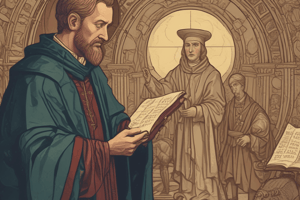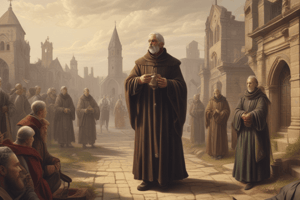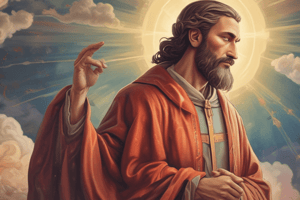Podcast
Questions and Answers
What concept did Luther emphasize as central to his beliefs?
What concept did Luther emphasize as central to his beliefs?
- Justification by Sacraments
- Justification by Tradition
- Justification by Faith alone (correct)
- Justification by Works
Who famously said, 'When the coin in the coffer rings, the soul from purgatory springs'?
Who famously said, 'When the coin in the coffer rings, the soul from purgatory springs'?
- Charles V
- Pope Leo X
- Martin Luther
- Johann Tetzel (correct)
What was the main purpose of the Leipzig Debate in 1519?
What was the main purpose of the Leipzig Debate in 1519?
- To gain support for the Pope
- To establish papal supremacy
- To debate Luther's teachings (correct)
- To promote indulgences
What significant event took place at the Diet of Worms in 1521?
What significant event took place at the Diet of Worms in 1521?
Which statement correctly reflects Luther's views on the authority of the Church?
Which statement correctly reflects Luther's views on the authority of the Church?
Which of the following reforms did Luther implement in his home?
Which of the following reforms did Luther implement in his home?
What was the outcome of the Augsburg Confession of 1530?
What was the outcome of the Augsburg Confession of 1530?
What was the significance of the Act of Supremacy in 1534?
What was the significance of the Act of Supremacy in 1534?
Which of the following was NOT one of Henry VIII's wives?
Which of the following was NOT one of Henry VIII's wives?
Which war was associated with the conflicts during the Reformation in France?
Which war was associated with the conflicts during the Reformation in France?
What was one of the key features of the Dutch Republic during the 17th century?
What was one of the key features of the Dutch Republic during the 17th century?
Which monarch claimed the divine right of kings and exerted absolutism in England?
Which monarch claimed the divine right of kings and exerted absolutism in England?
Who was the leader of the Puritans during the English Civil War?
Who was the leader of the Puritans during the English Civil War?
What event marked the end of absolute monarchy in England and established parliamentary sovereignty?
What event marked the end of absolute monarchy in England and established parliamentary sovereignty?
Which scientist is known for formulating the laws of planetary motion?
Which scientist is known for formulating the laws of planetary motion?
Who is recognized as the father of modern anatomy?
Who is recognized as the father of modern anatomy?
What was a significant result of the scientific revolution on societal views?
What was a significant result of the scientific revolution on societal views?
What critical advancement did Isaac Newton contribute to science?
What critical advancement did Isaac Newton contribute to science?
The Toleration Act established in England provided religious freedoms for what group?
The Toleration Act established in England provided religious freedoms for what group?
What was the primary challenge faced by King Charles I leading to the English Civil War?
What was the primary challenge faced by King Charles I leading to the English Civil War?
What major event marked the beginning of the Thirty Years' War?
What major event marked the beginning of the Thirty Years' War?
Which treaty concluded the Thirty Years' War?
Which treaty concluded the Thirty Years' War?
What was the result of the Treaty of Fontainebleau?
What was the result of the Treaty of Fontainebleau?
Which of the following best describes Louis XIV's power as a monarch?
Which of the following best describes Louis XIV's power as a monarch?
What characterizes the Age of Absolutism in France?
What characterizes the Age of Absolutism in France?
Who was known as 'The Sun King'?
Who was known as 'The Sun King'?
Which phase of the Thirty Years' War involved Christian IV of Denmark?
Which phase of the Thirty Years' War involved Christian IV of Denmark?
What aspect of the Peace of Westphalia contributed to the concept of personal faith?
What aspect of the Peace of Westphalia contributed to the concept of personal faith?
What major action did Peter the Great take to modernize Russia?
What major action did Peter the Great take to modernize Russia?
Which of the following represented a significant consequence of the crises in the 17th century?
Which of the following represented a significant consequence of the crises in the 17th century?
What was the main consequence of the St. Bartholomew's Day Massacre?
What was the main consequence of the St. Bartholomew's Day Massacre?
Which of the following statements about Henry IV is true?
Which of the following statements about Henry IV is true?
What was a significant result of Philip II's reign in Spain?
What was a significant result of Philip II's reign in Spain?
Which event is associated with William the Silent?
Which event is associated with William the Silent?
What role did Elizabeth I play in the religious landscape of England?
What role did Elizabeth I play in the religious landscape of England?
What was one of the main objectives of Portuguese exploration in the New World?
What was one of the main objectives of Portuguese exploration in the New World?
Which of the following was a key factor in Christopher Columbus's voyages?
Which of the following was a key factor in Christopher Columbus's voyages?
What was one of the outcomes of the Treaty of Tordesillas?
What was one of the outcomes of the Treaty of Tordesillas?
Who was acknowledged as the first head of state to be assassinated?
Who was acknowledged as the first head of state to be assassinated?
What navigational tool helped explorers during the Renaissance?
What navigational tool helped explorers during the Renaissance?
What was Hernan Cortez known for?
What was Hernan Cortez known for?
Which of the following statements about the Columbian Exchange is accurate?
Which of the following statements about the Columbian Exchange is accurate?
What motivated Spain’s conquests in the New World?
What motivated Spain’s conquests in the New World?
What was a prominent feature of the Spanish rule in the Low Countries?
What was a prominent feature of the Spanish rule in the Low Countries?
Why is Ferdinand Magellan significant in the context of explorations?
Why is Ferdinand Magellan significant in the context of explorations?
Flashcards
Luther's Justification by Faith
Luther's Justification by Faith
Luther's belief that salvation comes through faith in Jesus Christ, not good works.
Indulgences
Indulgences
The remission of the temporal punishment of sins by the Church.
Ninety-Five Theses
Ninety-Five Theses
Luther's list of arguments against indulgences, sparking the Protestant Reformation.
Diet of Worms
Diet of Worms
Signup and view all the flashcards
Edict of Worms
Edict of Worms
Signup and view all the flashcards
Wartburg Castle
Wartburg Castle
Signup and view all the flashcards
German Bible (1534)
German Bible (1534)
Signup and view all the flashcards
Magisterial Reform
Magisterial Reform
Signup and view all the flashcards
Peace of Augsburg
Peace of Augsburg
Signup and view all the flashcards
Act of Supremacy
Act of Supremacy
Signup and view all the flashcards
Thirty Years' War
Thirty Years' War
Signup and view all the flashcards
Peace of Westphalia
Peace of Westphalia
Signup and view all the flashcards
Louis XIV
Louis XIV
Signup and view all the flashcards
Absolutism
Absolutism
Signup and view all the flashcards
Palace of Versailles
Palace of Versailles
Signup and view all the flashcards
Peter the Great
Peter the Great
Signup and view all the flashcards
Defenestration of Prague
Defenestration of Prague
Signup and view all the flashcards
Edict of Nantes
Edict of Nantes
Signup and view all the flashcards
Czar
Czar
Signup and view all the flashcards
Gustavus Adolphus
Gustavus Adolphus
Signup and view all the flashcards
St. Bartholomew's Day Massacre
St. Bartholomew's Day Massacre
Signup and view all the flashcards
Henry IV of France
Henry IV of France
Signup and view all the flashcards
Council of Blood
Council of Blood
Signup and view all the flashcards
William the Silent
William the Silent
Signup and view all the flashcards
Dutch Reformed Church
Dutch Reformed Church
Signup and view all the flashcards
Elizabeth I
Elizabeth I
Signup and view all the flashcards
Elizabethan Settlement
Elizabethan Settlement
Signup and view all the flashcards
Invincible Spanish Armada
Invincible Spanish Armada
Signup and view all the flashcards
Columbian Exchange
Columbian Exchange
Signup and view all the flashcards
Conquistadors
Conquistadors
Signup and view all the flashcards
Hernan Cortez
Hernan Cortez
Signup and view all the flashcards
Christopher Columbus
Christopher Columbus
Signup and view all the flashcards
Treaty of Tordesillas
Treaty of Tordesillas
Signup and view all the flashcards
Prince Henry the Navigator
Prince Henry the Navigator
Signup and view all the flashcards
Petersburg's nickname
Petersburg's nickname
Signup and view all the flashcards
Dutch Republic's Golden Age
Dutch Republic's Golden Age
Signup and view all the flashcards
Religious Freedoms in the Dutch Republic
Religious Freedoms in the Dutch Republic
Signup and view all the flashcards
House of Orange
House of Orange
Signup and view all the flashcards
James I's claim
James I's claim
Signup and view all the flashcards
English Civil War
English Civil War
Signup and view all the flashcards
Oliver Cromwell
Oliver Cromwell
Signup and view all the flashcards
Glorious Revolution
Glorious Revolution
Signup and view all the flashcards
Heliocentrism
Heliocentrism
Signup and view all the flashcards
Inductive Reasoning
Inductive Reasoning
Signup and view all the flashcards
Study Notes
Chapter 5: The Lutheran Reformation
- Luther sought truth in scripture, Romans 1:17 emphasized "the just shall live by faith." Justification was by faith alone.
- Pope Leo X commissioned St. Peter's Cathedral (Vatican).
- Johann Tetzel sold indulgences, promising salvation.
- "When the coin in the coffer rings, the soul from purgatory springs."
- Luther's Ninety-Five Theses, October 31, 1517, sparked the Protestant Reformation.
- The Diet of Augsburg in 1518 and Leipzig Debate in 1519.
- Luther argued that the Pope and Church were not infallible.
- The Bible should be the supreme authority.
- Luther aimed to guide the German people to the scripture.
- Excommunicated in 1521.
- Charles V did not want to upset the princes.
- The Diet of Worms, 1521, summoned Luther.
- Luther refused to recant his views.
- The Edict of Worms declared Luther a heretic.
- He was kidnapped and taken to Wartburg Castle.
Rise of Lutheranism
- Luther lived in Wartburg Castle under the disguise "Knight George."
- He translated the Bible into German (1534).
- Katherine von Bora, Luther's wife, played a role in the Reform.
- Luther's reforms in church included replacing Latin singing with German.
- "A Mighty Fortress Is Our God" was composed.
- Collaboration between Church and State was a key aspect.
- The German Peasant's War began in 1524 and Luther opposed it.
- The Augsburg Confession of 1530 codified Protestant beliefs.
- Philip Melanchthon was a crucial figure instrumental in the German Reform.
- The Peace of Augsburg in 1555 established religious principles based on the reigning prince's choice.
The Reformation Spreads
- The Reformation influenced England under Henry VIII.
- Henry VIII, the Defender of the Faith, sought a male heir.
- He divorced Catherine of Aragon, establishing the independent Church of England, and eventually had multiple marriages.
- The Church of England separated from Rome in 1534.
- Other key figures involved included Anne Boleyn, Mary, Elizabeth.
- The Act of Supremacy recognized the King as the head of the Church.
- Religious wars intensified, with Huguenots vs. Catholics in France, and conflicts between various factions.
Catholic Reformation and Religious Wars
- French politics and religious debates were complicated, centering around Francis I and the House of Valois.
- Conflicts arose concerning the Protestant beliefs and the Affair of the Placards in 1534.
- Religious war became a major element in France.
- Ultimately, Henry IV issued the Edict of Nantes granting religious freedom in 1598.
- Henry IV or "Good King Henry" reverted to Catholicism.
Spain
- "Paris is worth a mass."
- The Edict of Nantes, 1598, granted religious freedom to French Huguenots.
- Philip II, associated with Spain’s wealth, squandered New World resources, and sparked religious conflict.
- Religious conflicts in The Netherlands led to the growth of Dutch Reformed Church.
- Philip II was involved in the Council of Blood in the Netherlands.
- Netherlands gained independence in 1581
England
- Elizabeth I, "Good Queen Bess", restored Anglican Protestantism
- The Elizabethan Settlement was a compromise to prevent Catholic-Protestant conflict and further upheaval.
- Key figures including Mary Stuart played a pivotal role.
- Scottish reformation was also important.
- Elizabeth I stabilized English Protestant reform
Discovery and Conquest in the New World (1450-1600)
- European exploration and the New World: exploration aimed at trade routes.
- Christopher Columbus' voyages were pivotal events.
- The Spanish aimed to expand their empire and consolidate power in the Americas.
- New world empires were built in the 15th and 16th centuries.
The Scientific and Rational Revolutions (1450-1700)
- The scientific revolution saw advancements in astronomy, moving from a geocentric theory to a heliocentric one championed by Copernicus, Kepler and Galileo.
- Key figures like Isaac Newton influenced the shift in scientific thought.
- The implications affected medicine, chemistry, and various other fields.
- Modern scientific methods, inductive reasoning and technology were critical.
The Search for Order, Absolutism, and Constitutionalism (1600-1700)
- The 17th century was a significant era of religious and political change.
- Factors like the Thirty Years' War were critical in shaping Europe’s religious and political landscape.
- Shifting power dynamics led to the rise of absolutist monarchies, and religious conflicts in Europe.
- Religious freedom and religious tolerance had more profound impacts.
Absolute Monarchy: Louis XIV (France)
- Louis XIV, the "Sun King," was an influential absolutist monarch.
- He consolidated power, resulting in both achievements and struggles from 17th and 18th century politics.
Limited Government: The Dutch Republic and England
- The Dutch Republic developed a unique system of government that limited centralized power.
- The British also began to shift towards constitutional monarchy as a result of factors like the English Civil War.
Studying That Suits You
Use AI to generate personalized quizzes and flashcards to suit your learning preferences.
Related Documents
Description
Explore the key events and figures in Chapter 5 of the Lutheran Reformation. From Martin Luther's Ninety-Five Theses to his stand at the Diet of Worms, this quiz covers his teachings on justification by faith and the challenges he posed to the Catholic Church. Test your knowledge of how Lutheranism emerged and shaped Christianity.




